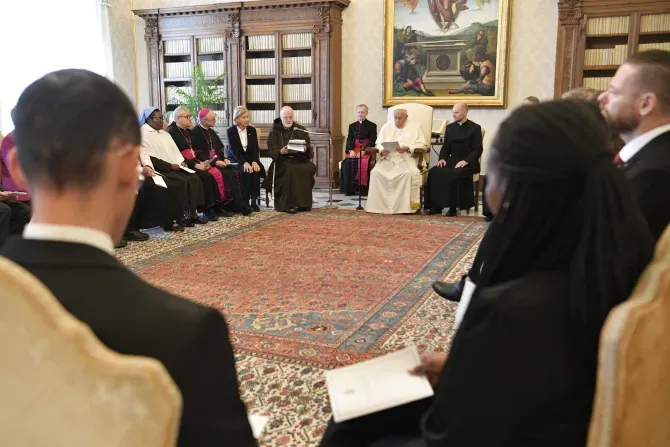He said a U.S.-based Catholic foundation has secured external funding for the commission, allowing it to hire new staff members, who will provide support to the different local churches.
O’Malley said the group has also established what it is calling the Memorare Program, “in honor of the prayer to the Blessed Mother that anyone who comes to you for help will not remain unaided.”
The program has a fund of 3 million euros ($3.3 million) provided by donors from bishops’ conferences in prosperous parts of the world to provide financial support for safeguarding measures in poorer parts of the Church.
During their audience, Pope Francis invited the commission to follow three principles as part of living “a spirituality of reparation” for the sin of abuse.
(Story continues below)
“No one today can honestly claim to be unaffected by the reality of sexual abuse in the Church,” he said.
He said the first principle is “where harm was done to people’s lives, we are called to keep in mind God’s creative power to make hope emerge from despair and life from death.”
“The terrible sense of loss that many experience as a result of abuse can sometimes seem a burden too heavy to bear,” he said. “Church leaders, who share a sense of shame for their failure to act, have suffered a loss of credibility, and our very ability to preach the Gospel has been damaged. Yet the Lord, who brings about new birth in every age, can restore life to dry bones.”
He acknowledged the devastating consequences abuse can have on the lives of victims, including in their future relationships.
“Where life is broken, then, I ask you to help put pieces back together, in the hope that what is broken can be repaired,” he asked commission members.
“This,” he continued, “is the path of healing and redemption: the path of Christ’s cross.”
Thirdly, he asked the group to cultivate a respectful, kind, and gentle approach with victims.
Quoting American poet and activist Maya Angelou, he said, “I’ve learned that people will forget what you said, people will forget what you did, but people will never forget how you made them feel.”
“The principles of respect for the dignity of all, for right conduct and a sound way of life must become a universal rule, independent of people’s culture or economic and social condition,” he said.
“Indeed, a culture of safeguarding will only take root if there is a pastoral conversion in this regard among the Church’s leaders.”
Hannah Brockhaus is Catholic News Agency's senior Rome correspondent. She grew up in Omaha, Nebraska, and has a degree in English from Truman State University in Missouri.








